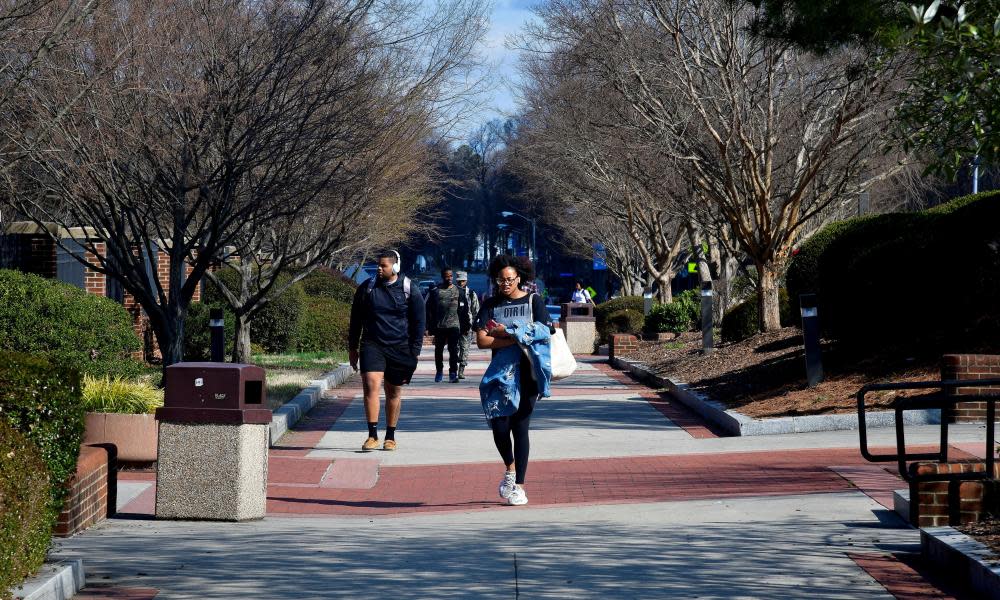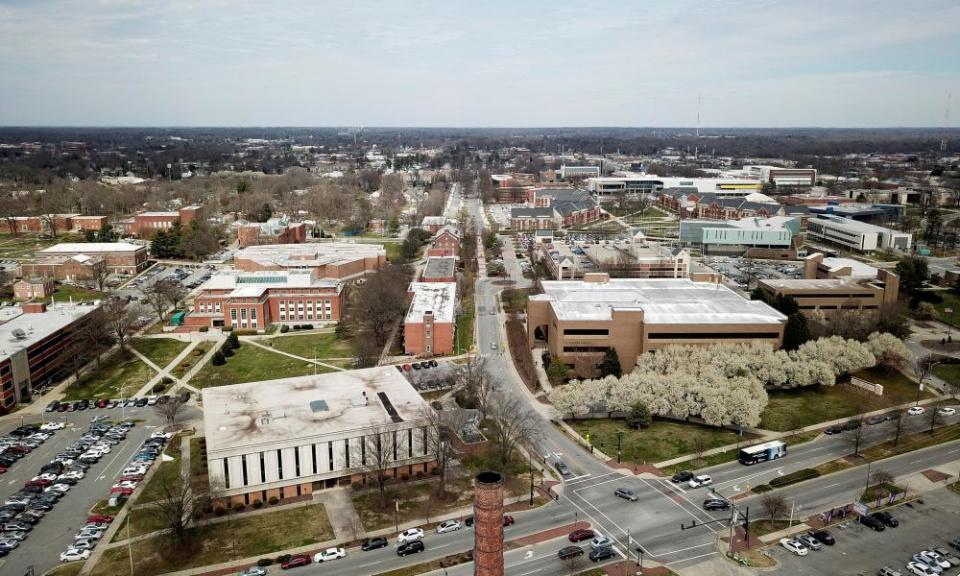How a Republican plan to split a Black college campus backfired

She didn’t know it at the time, but when Jonezie Cobb first set foot on North Carolina A&T State’s 13,000-person campus as a freshman last fall, the university was split in two.
In 2016, Republican state legislators had drawn a line down Laurel Street, which runs through the middle of campus, effectively dividing the nation’s largest historically black university into separate congressional districts.
Walking from the library to the dining hall, Cobb would frequently cross from the state’s sixth district over into the 13th, both represented by white Republicans: Mark Walker and Ted Budd.
Related: Why this election calls into question whether America is a democracy
Cobb, now a sophomore, remembers first learning about the distinct districts from student groups that were organizing calls, protests and even a visit to Walker and Budd’s offices in Washington DC. However, after a court decision late last year, for the first time since 2012, the university’s students will be voting in a general election under the umbrella of a single district.
The newly minted sixth district, which includes all of A&T as well as the largely Black cities of Winston-Salem and Greensboro, is one of two North Carolina congressional seats likely to flip in favor of Democrats in the election. In the other – the state’s second district – Republican incumbent representative George Holding announced after the 2019 redistricting that he would not be seeking reelection.
Cobb, who is 19 and studying political science, cast her vote on the first day of early voting at a polling station on campus. The station itself was another fight – last fall, dozens of A&T students packed the county’s board of elections meetings to lobby for a voting site at the university, a request that was eventually granted.
These forms of suppression, intentional or not, made voting feel even more important, Cobb said.
“As African Americans we pride ourselves in voting, because that’s what our ancestors fought for,” she said. “It’s something that I will never forget.”
More than 37,000 people aged 18-29 have already voted in the sixth district, nearly twice the tally recorded in 2016. Statewide, of the 3.3m votes cast, 12% have come from Cobb’s age group, up more than a point over 2016.
As African Americans we pride ourselves in voting, because that’s what our ancestors fought for
Jonezie Cobb
Rachel Weber, the North Carolina press secretary for voting advocacy group NextGen America, said she believes the uptick can be explained by young people feeling the effects of the political world on their day-to-day lives more than ever.
“We have lived through four years of an administration that has attacked the issues near and dear to our hearts, whether it be racial justice or affordable healthcare,” Weber said. “Politics are closer to young people right now.”
Students at A&T rallying against racially biased districting and maps “that don’t represent us and where we live” is a prime example of the youth activism and political engagement endemic in the current election, she added.
A&T has a long history of organizing around politics and racial justice: the Greensboro Four – the group of Black activists whose sit-ins in 1960 at a local department store helped further the civil rights movement – were all students at the university.
But in the past year, gerrymandering has been added to the list of seemingly evergreen conversation topics on campus that include economic inequality, criminal justice reform and systemic racism, said Derick Smith, a political science lecturer at the university.
“[Students] became personally aware and highly agitated that they were being targeted by this particular suppression method,” Smith said. “They felt like diluting their voice and their vote was criminal.”
The 2016 move to split the campus came after Republican legislators were forced to remake North Carolina’s congressional maps after a US supreme court ruling deemed the previous ones unconstitutionally gerrymandered.

Legislators freely admitted, however, that they would draw the new maps intending to consolidate and water down certain voting blocs, including the state’s roughly 1.5 million Black registered voters.
“We want to make clear that we, to the extent, are going to use political data in drawing this map, it is to gain partisan advantage on the map,” the Republican legislator David Lewis said at the time. “I want that criteria to be clearly stated and understood.”
Those maps were likely “extreme partisan gerrymanders” a panel of North Carolina judges found last year, forcing legislators again back to the drawing board. The current maps were finally approved by judges in December.
Smith said he’s already seen impacts from the redistricting. Congressional candidates have been spotted around campus and in the community, something that rarely happened when the area was a surefire Republican stronghold.
But there is still work to do, he added. Following the 2020 census, the state will have to once again come up with new congressional and legislative districts. To avoid racism and partisan bias, Smith said, the state should look to models such as California and Colorado, which have shifted the responsibility for district line-drawing from politicians to citizens or independent bodies.
“The citizens should have a greater role in drawing these maps as they affect their lives,” Smith said. “It shouldn’t be a spoils system for the party that wins an election – in a Democracy, they shouldn’t be picking their voters.”
Without any sort of protections in place, A&T is just one of many communities across the US that will continue to not receive fair and equal political representation, he added.
“There’s no way the fate of Black voters should be left up to partisan design, because we’re going to lose every time,” Smith said.

